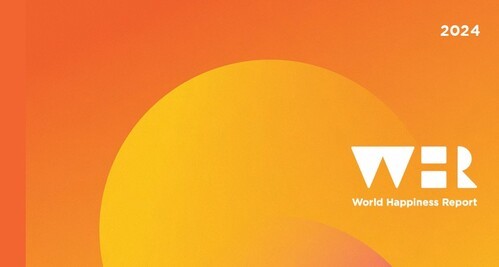March 20th, 2024
by Jonathan Richerson
by Jonathan Richerson

You might have not realized it, but today is the International Day of Happiness! This day was established by the United Nations through resolution 66/281 on July 12, 2012. Their website explains:
It’s a day to be happy, of course! Happiness is a fundamental human goal. The United Nations General Assembly recognizes this goal and calls for “a more inclusive, equitable and balanced approach to economic growth that promotes the happiness and well-being of all peoples.”
Governments and international organizations should invest in conditions that support happiness by upholding human rights and incorporating well-being and environmental dimensions into policy frameworks, such as the 17 Sustainable Development Goals. The effectiveness of governments in upholding peace and social order, as well as in the fields of taxation, legal institutions and delivery of public services, strongly correlates with average life satisfaction.
The United Nations invites each person of any age, plus every classroom, business and government to join in celebration of the International Day of Happiness. https://www.un.org/en/observances/happiness-day
Everyone wants to be happy, but not everyone has the same idea of what it takes to be happy. According to the UN, the government is instrumental in one’s happiness. Is that true? To help determine where happiness takes place and to go along with this annual date, Gallup established the World Happiness Report — a partnership of Gallup, the Oxford Wellbeing Research Centre, the U.N. Sustainable Development Solutions Network, and the WHR's Editorial Board. And this year’s report brought some unhappy news for Americans. For the first time in 12 years, The United States is no longer among the 20 happiest countries in the world. The U.S. now ranks at No. 23, compared to No. 15 last year. The researchers say the decline is due to how Americans under 30 feel about their lives.
"In the US, happiness or subjective wellbeing has decreased in all age groups, but especially for young adults," Gallup managing director Ilana Ron Levey told CBS News in an emailed statement, adding that social connections are one key factor contributing to these generational disparities in happiness. “The World Happiness Report and the Gallup/Meta social connectedness data show peak loneliness for younger Americans. It's widely recognized that social support and feelings of loneliness are influential factors in determining overall happiness, and these dynamics differ across various age groups," she said. "The quality of interpersonal relationships may impact the wellbeing of younger and older individuals in distinct ways."
So, is it age, the government, social media or quality of relationships? Taking a closer look at the actual data shows the researchers broke participants down, not only by country, but by age, which revealed a greater truth.
Happiness has declined among 15- to 24-year-olds in North America, Western Europe, the Middle East/North Africa and South Asia since 2019. In places like the U.S. and Canada, for example, rankings for those 60 and older are at least 50 places higher than for those under 30. However, in many countries, particularly those in Central and Eastern Europe, the reverse is true: The young are happier than the old.
"Piecing together the available data on the wellbeing of children and adolescents around the world, we documented disconcerting drops especially in North America and Western Europe. To think that, in some parts of the world, children are already experiencing the equivalent of a mid-life crisis demands immediate policy action," said Jan-Emmanuel De Neve, director of Oxford's Wellbeing Research Centre and an editor of the World Happiness Report. www.gallup.com
Even the researchers want to blame a drop in happiness on government policies, even when their own research centered around age. Taking into account the age, social order and what most of us see and hear from young people every day, it’s not government policy, but personal accountability. Young people have access to more information than any generation before them. They also have become reliant on social media for their news, ethics and self-worth. It’s easy to see why those not online in a higher age bracket are happier than those who are younger and spend the majority of their time online. Older people did not have to go through the social media craze and have developed relationships with other people. Many younger people have online relationships and fewer personal connections. Previous wellbeing and happiness research has proven that happiness is always linked to one’s relationship to community. It goes to reason that a country like Finland (rank 1) is higher than the US (Rank 23) when adjusted by focusing on age 30 and younger the results show Finland is 7 and the US 62. Older Americans have other people in their lives.
There's lots more to learn, but it has always been obvious that the government cannot make people happy, no matter what they tell the people out of a sense of job security at election time. Personal happiness is up to the individual, but one cannot deny that unhappiness is contagious and toxic. Happiness is less contagious, but much more beneficial to society. Which will you choose to be today? You can add to the statistics, or you can make a difference by choosing to find happiness is whatever situation the Lord has you in at the moment, and knowing He is in full control!
I will be glad and rejoice in your love, for you saw my affliction and knew the anguish of my soul. You have not given me into the hands of the enemy but have set my feet in a spacious place. Psalm 31:7-8
Serving the Savior,
Bro. Jonathan
It’s a day to be happy, of course! Happiness is a fundamental human goal. The United Nations General Assembly recognizes this goal and calls for “a more inclusive, equitable and balanced approach to economic growth that promotes the happiness and well-being of all peoples.”
Governments and international organizations should invest in conditions that support happiness by upholding human rights and incorporating well-being and environmental dimensions into policy frameworks, such as the 17 Sustainable Development Goals. The effectiveness of governments in upholding peace and social order, as well as in the fields of taxation, legal institutions and delivery of public services, strongly correlates with average life satisfaction.
The United Nations invites each person of any age, plus every classroom, business and government to join in celebration of the International Day of Happiness. https://www.un.org/en/observances/happiness-day
Everyone wants to be happy, but not everyone has the same idea of what it takes to be happy. According to the UN, the government is instrumental in one’s happiness. Is that true? To help determine where happiness takes place and to go along with this annual date, Gallup established the World Happiness Report — a partnership of Gallup, the Oxford Wellbeing Research Centre, the U.N. Sustainable Development Solutions Network, and the WHR's Editorial Board. And this year’s report brought some unhappy news for Americans. For the first time in 12 years, The United States is no longer among the 20 happiest countries in the world. The U.S. now ranks at No. 23, compared to No. 15 last year. The researchers say the decline is due to how Americans under 30 feel about their lives.
"In the US, happiness or subjective wellbeing has decreased in all age groups, but especially for young adults," Gallup managing director Ilana Ron Levey told CBS News in an emailed statement, adding that social connections are one key factor contributing to these generational disparities in happiness. “The World Happiness Report and the Gallup/Meta social connectedness data show peak loneliness for younger Americans. It's widely recognized that social support and feelings of loneliness are influential factors in determining overall happiness, and these dynamics differ across various age groups," she said. "The quality of interpersonal relationships may impact the wellbeing of younger and older individuals in distinct ways."
So, is it age, the government, social media or quality of relationships? Taking a closer look at the actual data shows the researchers broke participants down, not only by country, but by age, which revealed a greater truth.
Happiness has declined among 15- to 24-year-olds in North America, Western Europe, the Middle East/North Africa and South Asia since 2019. In places like the U.S. and Canada, for example, rankings for those 60 and older are at least 50 places higher than for those under 30. However, in many countries, particularly those in Central and Eastern Europe, the reverse is true: The young are happier than the old.
"Piecing together the available data on the wellbeing of children and adolescents around the world, we documented disconcerting drops especially in North America and Western Europe. To think that, in some parts of the world, children are already experiencing the equivalent of a mid-life crisis demands immediate policy action," said Jan-Emmanuel De Neve, director of Oxford's Wellbeing Research Centre and an editor of the World Happiness Report. www.gallup.com
Even the researchers want to blame a drop in happiness on government policies, even when their own research centered around age. Taking into account the age, social order and what most of us see and hear from young people every day, it’s not government policy, but personal accountability. Young people have access to more information than any generation before them. They also have become reliant on social media for their news, ethics and self-worth. It’s easy to see why those not online in a higher age bracket are happier than those who are younger and spend the majority of their time online. Older people did not have to go through the social media craze and have developed relationships with other people. Many younger people have online relationships and fewer personal connections. Previous wellbeing and happiness research has proven that happiness is always linked to one’s relationship to community. It goes to reason that a country like Finland (rank 1) is higher than the US (Rank 23) when adjusted by focusing on age 30 and younger the results show Finland is 7 and the US 62. Older Americans have other people in their lives.
There's lots more to learn, but it has always been obvious that the government cannot make people happy, no matter what they tell the people out of a sense of job security at election time. Personal happiness is up to the individual, but one cannot deny that unhappiness is contagious and toxic. Happiness is less contagious, but much more beneficial to society. Which will you choose to be today? You can add to the statistics, or you can make a difference by choosing to find happiness is whatever situation the Lord has you in at the moment, and knowing He is in full control!
I will be glad and rejoice in your love, for you saw my affliction and knew the anguish of my soul. You have not given me into the hands of the enemy but have set my feet in a spacious place. Psalm 31:7-8
Serving the Savior,
Bro. Jonathan
Recent
Archive
2025
2024
January
February
April
May
June
August
October
November
2023
June
July
September
November
Categories
Tags
no tags

No Comments